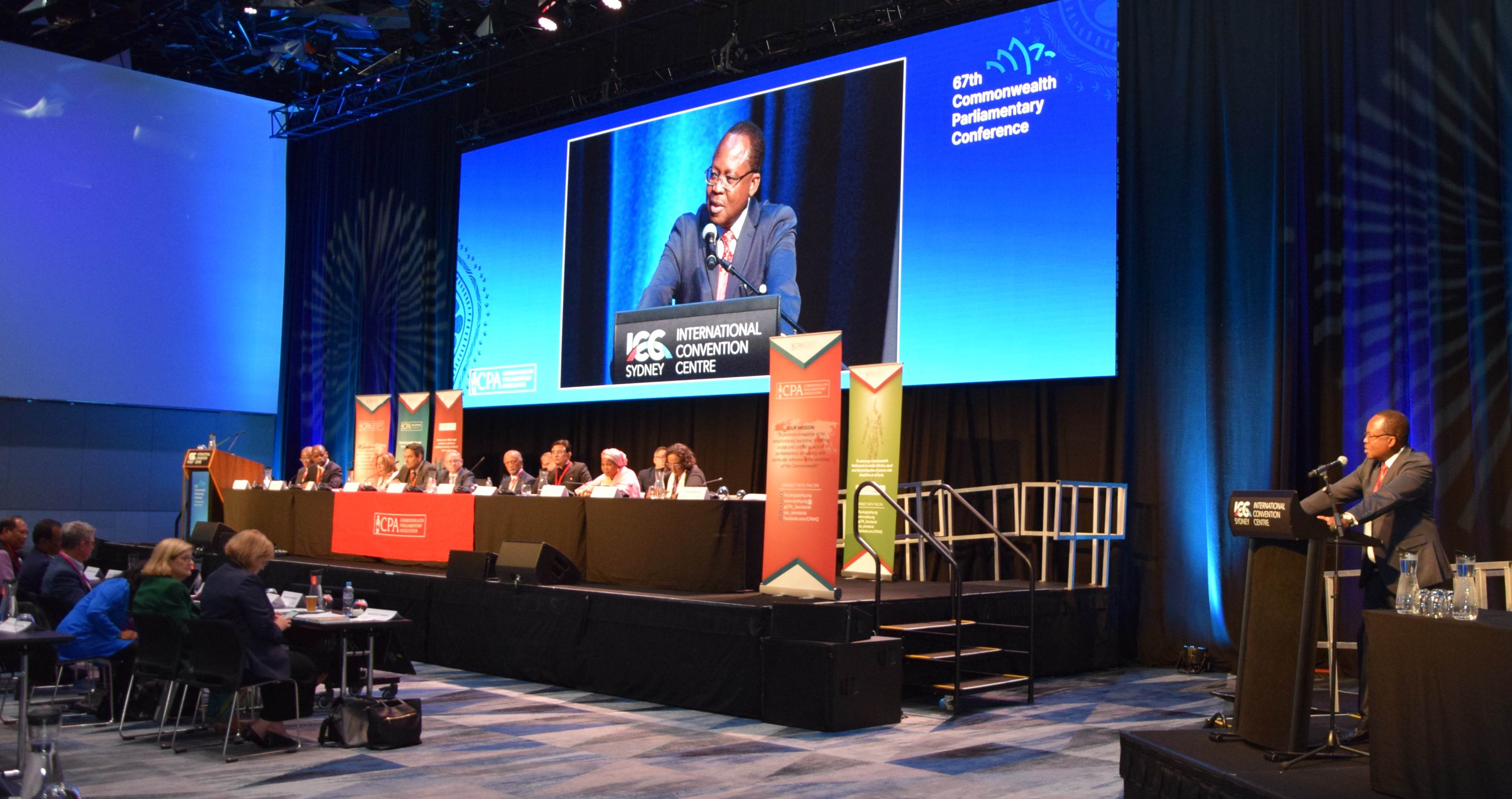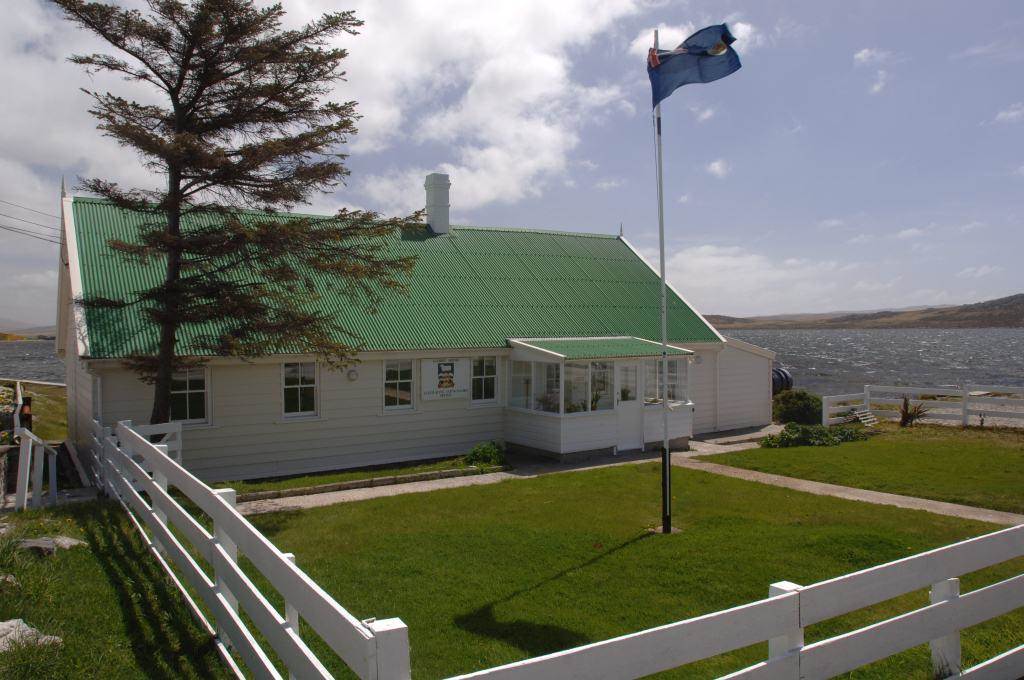
Meet the new CPA Chairperson from Zambia
Q&A with Hon. Dr Christopher Kalila, MP (Zambia)

During the 2024 CPA General Assembly at the 67th Commonwealth Parliamentary Conference in New South Wales on 7 November 2024, Members of the Commonwealth Parliamentary Association (CPA) elected Hon. Dr Christopher Kalila, MP (Zambia) as the new Chairperson of the CPA Executive Committee for a new three-year term.
Published 18 December 2024.
- Congratulations on your new role as the elected Chairperson of the CPA Executive Committee. You are a highly experienced Parliamentarian – can you highlight some of the lessons you have learned from your time in the Parliament of Zambia?
I would like to begin this conversation by thanking the membership of the CPA for giving me their votes and ushering me into the Office of Chairperson of the CPA Executive Committee. I would also like to particularly thank the CPA Africa Region for endorsing me as their candidate at the 53rd CPA Africa Regional Conference, held in Arusha, Tanzania.
A special thank you also goes to the Speaker of the National Assembly of Zambia, Rt Hon. Nelly B. K Mutti, SC, MP, FAPRA and my campaign team from the CPA Zambia Branch. To the CPA Secretariat, I commend you for the professional manner in which you handled the elections which were peaceful and free from any controversy.
In my time as a Parliamentarian, some of the important lessons I’ve learnt include:
- humility and remaining true to myself no matter the circumstances.
- loyalty to my party and endurance to wait for my turn for opportunities instead of cajoling for positions.
- continuous personal and professional development in order to remain relevant in the ever-changing Zambian society and the world around us.
- Respect for people around me.
- Can you tell us about your experience of the Commonwealth growing up, living and working in a Commonwealth country including your experience as a medical doctor?
I was born in Zambia two years after we gained independence from British rule. However, a number of neighbouring countries were yet to be independent, therefore, Zambia became the strategic centre for liberation struggles. I recall attending secondary school with children of freedom fighters who had been exiled at the time. From the sixties to around the nineties, Zambia welcomed a lot of freedom fighters from countries such as Namibia, Zimbabwe, Mozambique, Angola and South Africa.
It was also not uncommon to hear sounds of bombs being dropped in liberation centres, for instance I recall that there were major attacks on some liberation camps north of the city of Lusaka, at a place called Chikumbi. I am, therefore, very familiar with the realities of fighting for self-rule.
From the eighties to around the nineties, there were negotiations for the liberation of the whole Southern African Region. We could see on television, personalities such as the then British Prime Minister, Margaret Thatcher and Pieter Willem Botha, the then Prime Minister of South Africa, engaging in discussions with liberation leaders. During this period, the City of Lusaka became a hive of activity owing to the independence negotiations. In fact, in 1979, when Southern Africa liberation talks had already begun, Her Majesty Queen Elizabeth II travelled to Zambia to attend the Commonwealth Heads of Government Meeting.
When I went to secondary school, I begun to read about the Commonwealth and what it meant for Zambia to be part of it. It was also interesting to learn about the Commonwealth’s contribution to the liberation of a number of formerly colonised countries.
When I proceeded to University, liberation efforts were still underway in some countries and by the nineties, the whole Africa Region became independent.
Post imperialism, the Commonwealth is playing an important role in world affairs including in matters of economic development. I should also make mention that many Commonwealth states have similar judicial systems, and they also practice the Westminster parliamentary system owing to a shared history and common values and principles that continues in the present day.
As I conclude my response to this question, I would also like to state that at one time I read about the Lancaster House talks which gave rise to the independence of Zimbabwe. I also read that the independence of Zambia and Malawi were negotiated at Lancaster House, so the next time I am in London, it’s one of the places I would like to visit.
- You are the fifth CPA Chairperson from the CPA Africa Region and the second from Zambia (following Hon. Lavu Mulimba, MCC, MP from 1987 to 90) since the role of CPA Chairperson was created in 1967. What is the importance of the Commonwealth and the CPA in the CPA Africa Region?
Firstly, I would like to say that it is an honour to be the second Zambian to hold this position. Following my election, I actually made efforts to reach Hon. Lavu Mulimba but learnt that he had passed away. I would have loved to learn from him about what the Commonwealth was like and to learn about his experience as CPA Chairperson.
For the CPA Africa Region, the Commonwealth is an important grouping of countries with a shared history, and history is important because it helps us understand present circumstances and project the future ahead. Lessons learnt from history also help us to make informed future decisions.
On account of our shared history, most Commonwealth countries in the CPA Africa Region, have similar governance systems. We also share common values and principles of friendship, democracy, the rule of law, respect for human rights and peace building. Our shared history and common values also promote unity within the CPA Africa Region.
- The CPA networks – Commonwealth Women Parliamentarians (CWP), CPA Small Branches and Commonwealth Parliamentarians with Disabilities (CPwD) – play an important role in our work in connecting Parliamentarians. What role do you see for these networks in the CPA’s future work?
It is important to note that the CPA networks demonstrate how inclusive an Association we are. They play an important role in advancing the agenda of special interest groups such as women Parliamentarians and Parliamentarians with disabilities and they will continue to do so as we forge ahead to create a greater CPA.
In fact, amplifying the voices and work of the CPA networks is among my priorities. I intend to work closely with the CPA Secretariat and the leadership of the networks to ensure that we achieve the strategic objectives of the networks espoused in the 2022 to 2025 Strategic Plan.
Further as we embark on the formulation of the next strategic plan, I intend for the CPA Secretariat and I to consult widely within the CPA networks to ensure that their priorities and aspirations in general are met and that the networks have greater impact in the CPA and Commonwealth as a whole, particularly in their areas of interest.
- 60% of the Commonwealth’s 2.7 billion population is aged under 30. How can the Commonwealth and Parliamentarians engage with more young people? How can we involve young people in politics?
With this background on the composition of the Commonwealth population, it is important to take care that the youth are not left behind in politics and other avenues of decision making. Young people are vibrant, energetic and innovative and they want to add their voice and contribute to contemporary issues at the local and international level. The human resource that the pool of youths presents can be leveraged to achieve political and socio-economic development in the Commonwealth.
Young people can be encouraged to participate in politics by competing for seats in Parliament; they can be encouraged to participate in parliamentary processes through avenues such as Committees and engaging with Parliamentarians in constituencies and holding them to account for their actions or inaction; young people can also be involved in politics through Youth Parliaments.
- You have worked on health policy in a number of global organisations. Can you tell us more about this and any lessons you have learned from this important work?
Indeed I do work with a wide network of organisations in the area of health locally and globally. Some of this work includes working with young people to prevent alcohol and substance abuse and to rehabilitate substance users; promotion and protection of sexual reproductive health rights; I am a member of the Global Tuberculosis Caucus; I work on the Commonwealth Pharmacists Association (CPA) Legislators Initiative on Antimicrobial Resistance; and I am also a campaigner for a tobacco free world, among many other causes.
An important lesson I have learnt working in the area of health is that of collaboration. Tackling health issues requires multi-sectoral approaches and collaboration at the local, regional and global levels.
While working in the area of health, I have also come to realise that the CPA, like other organisations as such as the Inter-Parliamentary Union (IPU), should position itself strategically and robustly to address prevailing and emerging health issues within the Commonwealth and beyond.
For instance, while working in the area of combating tuberculosis, I recently learnt that about 50% of the world’s tuberculosis cases are in the Commonwealth and the question that arose was, what is the Commonwealth doing about this health situation?
Therefore, in my time as CPA Chairperson, another aspect of the CPA’s work I want to champion is that of health.
- As 2024 draws to a close, do you have a New Year message for the CPA membership and other readers of The Parliamentarian?
I would like to wish the CPA membership and other readers of The Parliamentarian a very Merry Christmas and a prosperous year ahead.
Finally, to the CPA membership, we have a busy year ahead as we wind up the 2022 to 2025 CPA Strategic Plan and formulate the next one. I look forward to working with all the CPA Branches in making the CPA more exciting, greater and more strategic in participating in global affairs, especially as we transition to an international, inter-parliamentary organisation.
This Q&A article first appeared in the CPA's Journal, The Parliamentarian (2024 Issue Four).
Download this issue below or click here to read online.




